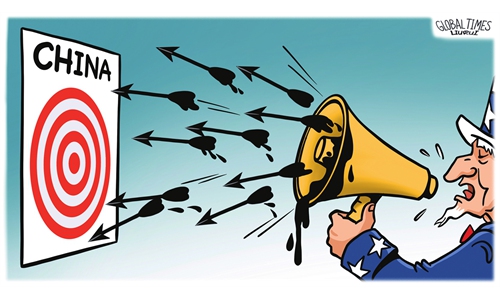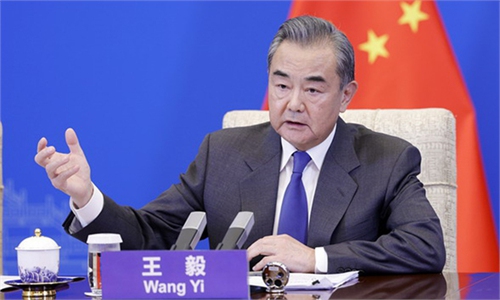
Milking the crisis Illustration: Liu Rui/GT
"Let the gull'd fool the toils of war pursue, where bleed the many to enrich the few," wrote the 18th-century English poet William Shenstone.
That is what is exactly happening during the Russia-Ukraine conflict. Whether it's the people of war-torn Ukraine, sanction-ridden Russia, or insecurity-ingrained Europe, all have suffered greatly. The US, the culprit of the Ukraine crisis, has been constantly taking advantage of others' misfortune to maintain its hegemony.
Every why has a wherefore. Edward Carr, a leading British scholar of international relations, reminded people more than 80 years ago that the US was a master in using kindness to disguise selfishness. Boasting abundant resources, strong industry and geographical advantage, Ukraine could have achieved development. While the country pursued a relatively balanced policy in the early years of its independence, the US supported and incited the Orange Revolution in 2004 and the Square Revolution in 2014 to push for a pro-Western agenda, splitting Ukraine politically from within and geopolitically between Russia and Europe. It is really thought-provoking that the "Gateway to Europe" has become one of the poorest countries in Europe, the frontline of NATO's eastward expansion, and the fault line of "color revolutions" and conflicts.
In 2014 when the crisis broke out in eastern Ukraine, while Germany, France, Russia and Ukraine held several rounds of consultations and signed two Minsk Agreements to cool down the situation, the US took an opposite direction to fan the flame by inciting the anti-Russian and pro-Western forces in Ukraine to escalate the conflicts on the ground. In the current Russia-Ukraine conflict, the US is reaping the benefits without getting itself involved militarily. It never intended to come to Ukraine's rescue, the idea used as a political tool by the US to trap Russia in a seemingly endless conflict.
We might need to go a bit further back into history to conclude how the US hegemony had created all the security trouble for Europe, Russia and Ukraine. It is well known that the US became a global superpower after the two world wars which plunged Europe into chaos and destruction and led to its dependence on the US military hegemony and NATO. Looking for a pathway to common security, Europe and the US signed the Helsinki Accords with the Soviet Union in 1975, which saw the establishment of the Organization for Security and Cooperation as well as the indivisible, cooperative and comprehensive approach to security.
However, after the Cold War, the US overturned the European security agenda and rejected Russia's bid to join NATO four times. The aim was to make Russia the imaginary foe to justify US hegemony. Since 1999, the US launched five major NATO expansions, pushing its borders eastward by more than 1,000 kilometers to include a large number of Eastern European countries, splitting Europe further. It also promised Ukraine, Georgia and other members of the Commonwealth of Independent States (CIS) NATO membership, posing a realistic threat at the doorstep of Russia.
Due to the hegemonic mentality and actions by the US, the vision of indivisible common security broke into pieces, and Russia, Ukraine and Europe were left in a security dilemma and constant conflicts. Former US congressman Tulsi Gabbard stated in a recent interview that President Joe Biden could have ended the crisis by promising not to admit Ukraine to NATO. But he didn't, because the US is seeking an excuse to impose sanctions on Russia, and it could profit from war for the American military-industrial complex.
Ukraine has become another victim in a series of global security crises instigated by the US, just like Iraq, Afghanistan, and Syria. Now the hegemonic power is pushing for an Asian version of NATO expansion via its Indo-Pacific Strategy, aiming to contain China.
Hegemony is the source of evil and chaos, while the common security is the only correct option to avoid and end crises. Whether it is Europe or Asia, the rationales of security are the same: Security cannot be enjoyed exclusively, but only shared; It is not a zero-sum game, but win-win cooperation. History may prove again that, the one who makes a fool of others will eventually make a fool of himself.
The author is a commentator on international affairs, writing regularly for Global Times, China Daily, and other publications. He can be reached at xinping604@gmail.com


